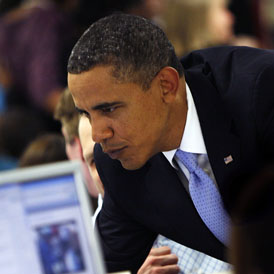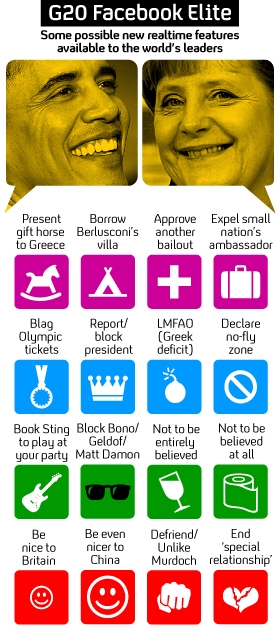Obama and G20 leaders use secret Facebook-style network
A secret network which looks and works like Facebook is being used by world leaders to chat in real-time. Channel 4 News reveals how it’s shaping the way G20 nations communicate in 2011.

Does Barack Obama “like” David Cameron‘s latest status update? Is Angela Merkel “poking” President Medvedev?
The world’s most powerful men and women are using a secret “Facebook-style” network to communicate before they make big decisions on global affairs.
Members of the “elite” G20 group can send messages in real-time, like Facebook Chat or Instant Messenger. They can also upload important policy documents and strategy ideas for each other to see and comment on.
Cameras from Sweden’s SVT.se were the first given access to film the network in action.
Linus Brohult, a reporter at SVT, told Channel 4 News about the intriguing conversations he saw taking place.
“I could see a discussion thread about the G20 protesters, someone was writing about the negative media coverage the protests had got.
I could see a discussion thread about the G20 protesters. Linus Brohult
“What’s interesting is that the network is being used both between the G20 meetings and during the meetings.
“Of course the main purpose is a more relaxed way to negotiate, but it is also being used for other discussions.”
The company behind the software, Canada-based OpenText, was commissioned by G20 world leaders to build the tool. The firm promises to “bring together people, processes and information”.

Spokesman James Latham said: “I think that real-time discussion becomes very important as the world leaders are trying to work through their positions, their policies and ultimately their decisions.”
Matt Brian from The Next Web is not surprised the likes of Obama and Cameron are choosing this kind of technology over the traditional phone “hot line” between the White House and Downing Street.
He told Channel 4 News: “Governments are starting to realise the effectiveness of real-time communication, and social networks like Facebook and Twitter have helped show how useful the medium can be.
“The networks are low-cost and can be used across a range of devices, lending themselves to integration on a governmental scale.
“With ministers and officials constantly on the move, the need to communicate, collaborate and and even edit documents on-the-go has become a priority.”
I imagine Facebook would be flattered. The company is very open with the technologies it uses and it can help power or inspire another system. Matt Brian
The G20 network appears to have many similarities to Facebook – including “friends” or “contacts” lists and the capacity to recommend or “share” documents.
“I imagine that FB would be flattered,” says Brian.
“The company is very open with the technologies it uses and it can help power or inspire another system then I am sure the Facebook team would be very proud.
“Facebook didn’t invent the features it provides (in most cases), it just provides an integrated solution that ticks all the right boxes.”
Hacker threat?
In an era of increasingly high-profile computer hacks and the rising threat of cyber-warfare, can such a powerful network really stay secure?
In June the International Monetary Fund was targeted by a sophisticated cyber attack which infiltrated its intergovernmental group which overseas the global financial system.
James Latham from OpenText explained how the top-level clients on “elite Facebook” are protected from unwanted eyes.
He said: “The way that we secure the information is through a combination of secure platforms for social collaboration which allows each of the leaders to have information at their fingertips during the conference.”
So are we about to see a new world order where our leaders write “ROFL” and “Wassup *POTUS?” on each other’s walls? And can we expect status updates that read “OMFG! Anyone checked out Greek debt levels today?”
Perhaps not, but Matt Brian thinks the way our rulers talk to each other is certainly heading for a revolution.
“A multi-person video chat would lend itself well to such a service, something similar to Google Hangouts or Facebook’s Skype integration. They would, of course, need to be very heavily encrypted.”
*POTUS stands for “President of the United States”. ROFL is “rolling on the floor laughing“.